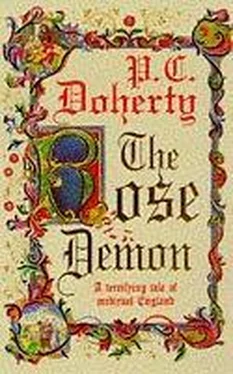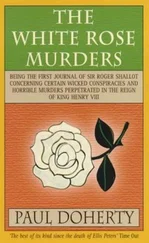Paul Doherty - The Rose Demon
Здесь есть возможность читать онлайн «Paul Doherty - The Rose Demon» весь текст электронной книги совершенно бесплатно (целиком полную версию без сокращений). В некоторых случаях можно слушать аудио, скачать через торрент в формате fb2 и присутствует краткое содержание. Жанр: Исторический детектив, на английском языке. Описание произведения, (предисловие) а так же отзывы посетителей доступны на портале библиотеки ЛибКат.
- Название:The Rose Demon
- Автор:
- Жанр:
- Год:неизвестен
- ISBN:нет данных
- Рейтинг книги:5 / 5. Голосов: 1
-
Избранное:Добавить в избранное
- Отзывы:
-
Ваша оценка:
- 100
- 1
- 2
- 3
- 4
- 5
The Rose Demon: краткое содержание, описание и аннотация
Предлагаем к чтению аннотацию, описание, краткое содержание или предисловие (зависит от того, что написал сам автор книги «The Rose Demon»). Если вы не нашли необходимую информацию о книге — напишите в комментариях, мы постараемся отыскать её.
The Rose Demon — читать онлайн бесплатно полную книгу (весь текст) целиком
Ниже представлен текст книги, разбитый по страницам. Система сохранения места последней прочитанной страницы, позволяет с удобством читать онлайн бесплатно книгу «The Rose Demon», без необходимости каждый раз заново искать на чём Вы остановились. Поставьте закладку, и сможете в любой момент перейти на страницу, на которой закончили чтение.
Интервал:
Закладка:
‘ Oh, Creatura bona atque parva! ’ he whispered. ‘Brave little man!’
‘You are a child,’ the Preacher declared.
‘He was kind,’ Matthias replied. ‘He could hold doves and knows the names of flowers. He showed me young fox cubs, he caught a rabbit and roasted it.’
Matthias blushed at the laughter from the villagers.
‘It’s true! It’s true!’ he cried.
He stamped his foot and the Preacher, mimicking him, stamped his. The villagers burst into laughter. Matthias, face burning red, fled the church, across the cemetery and into his house. He ran up the stairs and burst into his mother’s room. She was lying on the small four-poster bed, face buried in the bolsters. He ran up, tugging at her hand.
‘Mother, they are going to take him out and burn him!’
Christina lifted her sleep-laden face from the bolsters. Matthias could see she had been crying.
‘It’s finished,’ she whispered. ‘There’s nothing you can do. May God help us all!’
She let his hand drop and fell back on the bolsters, staring at the blue and gold tester over the bed.
‘Did your father speak?’
‘Some.’ Matthias bit back the insults he felt. ‘It made no difference.’
He walked slowly out of the chamber, closing the door silently behind him, and went down the rickety stairs. He sat for a while poking the cold ash in the fireplace with a stick. From the cemetery came the shouts and cries of the villagers. The door opened and his father came down the passageway. Matthias did not look up. He sat jabbing at the ash, wishing it were the Preacher’s face.
‘They’ve put him in the death house,’ Parson Osbert said. ‘The Preacher and others are guarding him. They. .’ Parson Osbert licked his dry lips. ‘He says sentence must be carried out by dusk. Fulcher and the rest, they are piling brushwood around the bear-baiting post. You know,’ he continued in a matter-of-fact voice, ‘it’s near the gallows. Matthias?’
The boy kept jabbing at the ash. His father came and knelt beside him.
‘Matthias, why did you speak?’
His son turned to him. Parson Osbert had grown old that morning: cheeks sagging, eyes constantly blinking.
‘I don’t know,’ Matthias replied.
‘He wants to see us,’ his father continued. ‘He made that last request: to see me, you and Christina before he died.’
‘I thought he would.’
Parson Osbert whirled round. Christina stood in the doorway, a woollen coverlet round her shoulders.
‘I thought he would,’ she repeated.
‘Christina, are you well?’
The parson went across and pressed his wife’s hands: they were lifeless and cold like those of a corpse. Her face had an unhealthy pallor. Her hair, usually so lustrous, now hung lank and untidy.
‘You don’t have to see him,’ Parson Osbert said.
‘He’s going to die, isn’t he? We’ll take him some wine, some bread.’ She went like a dreamwalker back up the stairs.
Parson Osbert went across to the small podium where the church missal was put. He opened this, pretending to study the gospel from the Mass of the day. He felt sick, anxious about the Preacher’s actions. Matters had proceeded far too fast. On his return, Baron Sanguis would not be pleased.
Christina came back. She’d put a dress over her linen shift, tied her hair back and covered it with a veil, wooden sandals on her feet. She took a small jug of wine from the buttery, some manchet loaves and, without saying a word, walked out of the house. Parson Osbert and Matthias hurried after her. The scene in the cemetery was like that of an armed camp. Women and children sat on the grass or on fallen headstones sharing out the food they had brought. Their menfolk strutted up and down, boldly showing off their rusty swords, daggers and spears and bent shields. A group of young men, under the direction of the Preacher, stood on guard outside the stone death house. As they approached, the Preacher held his hand up but Parson Osbert had regained his courage.
‘This is my church! This is my cemetery!’ he declared. ‘I must protest at the proceedings: the prisoner needs some spiritual comfort.’
The Preacher shrugged and stepped back. One of the young men pulled back the bolts. Parson Osbert stooped and went in. He wasn’t long and came out shaking his head. Christina took the bread and wine in. Matthias looked around the cemetery. He saw a wild rose bush and, using his small dagger, cut a shoot off. The rose was full-blown, still wet from the morning dew. The door to the death house was flung open; Christina, her face soaked with tears, came out. She brushed by her husband and ran across the cemetery.
‘You’d best go in, boy,’ Parson Osbert whispered. ‘But don’t be long.’
‘Will the lad be safe?’ a villager asked.
‘If the hermit wished to hurt him,’ Osbert snapped, ‘he would have done so already.’
The death house was dark. Matthias waited until the door slammed behind him, then he ran across. The hermit, sitting in the corner, embraced him warmly.
‘You spoke for me, Matthias,’ he murmured. ‘You spoke for me!’
The boy gave him the rose. ‘I thought you’d like this. It’s not as good as the one you drew in the church.’
The hermit took the rose. He laid it on the ground and, moving like a cat, he went and knelt before the boy.
‘Do not cry for me, Matthias. Promise me you won’t cry for me. Now go!’
The boy stared at him in puzzlement.
‘Go on!’ the hermit smiled. ‘Don’t worry, Matthias. Death is never an end to anything. Please! They will listen at the door. Please go! They’ll only become suspicious.’
Matthias left. His father had also gone. Someone said he was in the church. Matthias groaned: some of the village boys were coming towards him. They would only tease and taunt him about what had happened so, like a rabbit, he scuttled amongst the gravestones, climbed the cemetery wall and ran to the other end of the village. Here the lane snaked past the hedgerows towards the great road south to Bristol.
For a while Matthias hid in a ditch, thinking about what had happened. Now and again he would look at the sky and notice the black smoke rising like a plume from the village. He felt hungry so he stole back to his house. The kitchen was untidy, the platters unwashed, there was no sign of his parents.
Matthias ate some salted bacon and bread from the buttery then went into the cemetery. The place was now empty, the door to the death house flung open. Matthias walked into the village. He caught the smell of wood smoke and something else, like fat boiling over the fire. He turned the corner and stared in horror down the high street. Fulcher had done his job well. The old bear-baiting post had been taken out and put on a small makeshift platform. The hermit had been lashed to this, dry brushwood piled high around: the flames had already caught hold. As Matthias pushed his way through the crowd, he could just make out the hermit’s face behind the wall of flame. Yet something was wrong. The fire roared but the prisoner bound to the stake did not squirm or cry out. The villagers, too, were silent.
‘Is he dead?’ someone asked.
‘Has he fainted?’
Matthias sniffed, wrinkling his nose. He could not understand it: the fire must have caught the hermit’s body.
‘Has he swooned?’ someone shouted.
As if in answer, the hermit started to sing, his voice loud and clear through the flames. A chill swept through the assembled villagers. Men who had served in the King’s wars and seen others die in different horrible ways, stared aghast. The flames roared higher, hiding the hermit’s face. Still the song was sung, the words clear and full on the air: at first in French, ‘ La Rose du Paradis ’, the second verse in English. The voice was strong and vibrant like a man sitting on a summer afternoon carolling his heart out. Some of the villagers ran away. Others crossed themselves. A few fell on their knees. The singing died away. The stench of burning flesh became unbearable. Matthias, whose shoulder had been gripped by Joscelyn the taverner, broke free and fled up an alleyway.
Читать дальшеИнтервал:
Закладка:
Похожие книги на «The Rose Demon»
Представляем Вашему вниманию похожие книги на «The Rose Demon» списком для выбора. Мы отобрали схожую по названию и смыслу литературу в надежде предоставить читателям больше вариантов отыскать новые, интересные, ещё непрочитанные произведения.
Обсуждение, отзывы о книге «The Rose Demon» и просто собственные мнения читателей. Оставьте ваши комментарии, напишите, что Вы думаете о произведении, его смысле или главных героях. Укажите что конкретно понравилось, а что нет, и почему Вы так считаете.












